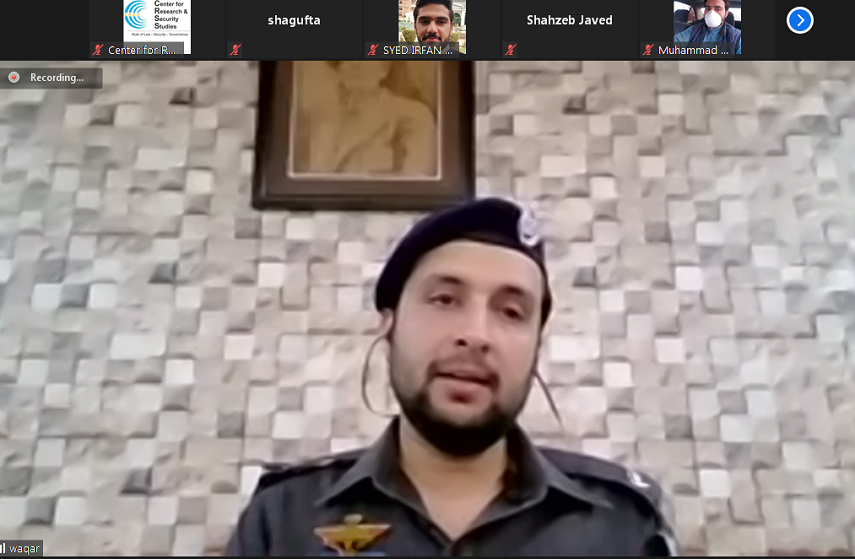The third and fourth rounds of Ulasi Taroon Online Workshops discussed the topics of Rule of Law and Interfaith Harmony, respectively, with around 40 youth leaders from different public and private sector universities across Khyber Pakhtunkhwa. The events were held as part of the Center for Research and Security Studies’ (CRSS) efforts to continue to cultivate the young through online conduits for communication, in the absence of physical platforms of youth engagement and development.
The third round discussed the challenges of rule of law especially during the COVID-19 times and the role of youth as responsible citizens and the hope of the nation.
Mr. Waqar Ahmad Kharal, SSP Operations, Mardan, said that the concept of rule of law – since its inception – has underscored that everyone is subject to law no matter how powerful, an idea that underpins equality and indiscriminate accountability in the society. Discussing the fundamental principles of rule of law, Mr. Kharral said that equality before the law is most essential prerequisite for rule of law and the law should be implemented across the board. We can’t expect rule of law to prevail in a country where there is no equality before the law and citizen’s equal entitlement to social, political and economic rights and opportunities.
The public participation in the decision-making processes is another essentiality for rule of law as it develops the public trust in government, enhances public accountability and leads to transparent and inclusive decision making.
Access to justice is also one of the basic principles of the rule of law. The citizens’ voices, rights and inclusion suffer the most in the absence of accessible justice. Rule of law requires the right of equal access to justice for all and transparent, non-discriminatory and accountable services. Propagating knowledge and information about the citizen’s constitutional rights also improves their access to justice as empowered citizens and ultimately cultivates rule of law. Besides, we should also strengthen our institutions like parliament, judiciary, election commission and media to strengthen and support the justice system. Arbitrary powers and decisions are contrary to the idea of rule of law and justice and there should be an absolute supremacy of law over arbitrary powers.
Just like other crises, rule of law faces some challenges during the COVID-19 times too. Most importantly, lack of awareness in the society regarding the seriousness of coronavirus where the citizens do not comply with the government’s regulations about social distancing and other safety precautions. This also makes it difficult for the law enforcement fraternity to implement SOPs for public health and safety during pandemic like lockdown and isolation. Besides the lack of awareness, misconceptions about the novel coronavirus turned out to be another big challenge to contain the pandemic as they brewed mistrust among the unaware public towards the government.
The fourth round of online workshops aimed to sensitize the participating youth leaders on the importance of inter-faith and intra-faith harmony.
Mr. Hasan Madni, a religious scholar noted that just like other professions, youth should also aspire to become religious leaders and aim to fulfill those peacebuilding roles and responsibilities that they think the religious fraternity is not fulfilling at the moment. They should promote the discourse – embedded in the tolerance perspective – about inter-religious and intra-religious trust and respect.
Youth leaders have a significant potential to promote social cohesion among diverse religious communities. They should engage with the diverse religious fraternity and address the misperceptions about the minority faiths and that how every religion promotes peace, humanity, and love. No religion is the cause of conflict, it is the subjective understanding of the followers that leads to inter-religious discord.
Only with critical thinking skills, can youth deal with the misconceptions about other religions. There is a huge onus on religious leaders to propagate the messages of social cohesion and mobilize the public for peacebuilding and coexistence without any regard to other citizens’ faiths.
We must have different opinions, faiths and backgrounds but we can still coexist peacefully and resolve differences through dialogue. The diverse religious communities should look at and build on the commonalities as no matter how big the differences, there are always some common grounds. Also, the difference of opinion is healthy for the society as it helps developing the new knowledge. We must learn to differ with others’ opinions respectfully.
Ms. Shagufta Khalique, an educationist, noted that COVID-19 is a serious challenge and has disrupted the entire range of social activities, but the youth stills remains a relevant actor for social change and development.
About Ulasi Taroon:
Ulasi Taroon is a counter radicalization initiative of CRSS that aims to address the radicalization challenges and extremist ideologies and foster social cohesion in KP through a discourse anchored in the core constitutional values. The endeavors aim cultivate and sensitize the target groups in these core values highlight the criticality of abiding by these concepts – such as adherence to rule of law, primacy and sanctity of constitution, equal citizenry, respect for fundamental human rights, tolerance for diversity and different opinions, inclusive democracy and good governance – as a measure of fostering social cohesion and peaceful co-existence.


